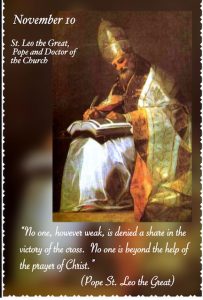According to the record, there are only two popes who gained the honor of this title, the “Great.” They are the pope St. Gregory the Great and the saint whose feast day the church celebrates today, St. Leo the Great. He was a humble priest dedicated to his pastoral duties. His work had been known to many, then he became a papal advisor in 420. He was in close contact with famous theologians and a papal envoy before he was elected the Bishop of Rome in 440. Pope Leo the Great expanded the understanding that the Pope’s supremacy is not simply rooted as a historical fact that Peter and Paul died on Roman ground, but because of the theological fact that papal authority resides from the Chair of Peter. Pope Leo the Great also affirmed with clarity and eloquence to the whole Church about Jesus Christ having both a divine and a human nature “without confusion or admixture.” He was able to save our tradition of Christmas when he argued that if Christ were not truly man, or not truly God, the babe in the manger would be just another child whose birth was no more worthy of celebration than that of famous personalities in the world.
These are some contributions of Pope Leo the Great in human history. In 452 he confronted Attila, the Hun, to back off from attacking Rome after making negotiations with the barbaric vandals. He loved to eradicate poverty, protecting Rome from invaders and maintaining Rome’s Christian heritage. Finally, he consolidated church governance and authority under a Roman Curia. The pope was given a role directly overseeing and enforcing discipline over bishops, mediating in and settling disputes; however these roles are now decentralized to Papal Discantry, meaning to various offices of the Vatican Curia. Pope Leo is most known for his sermons and letters, and in 1754 he was given an honor to be one of the Doctors of the Church. He was the first pope, after Saint Peter himself, to be buried in Saint Peter’s Basilica.
In today’s first reading from the letter of St. Paul to Philemon, Paul is clear that we are all united as brothers. Paul would make restitution for anything that was done by Onesimus, a slave whom Paul converted to Christianity while he was imprisoned. Maybe Onesimus owed something to Philemon. By sending out Onesimus, Paul says, he is truly sending part of his own heart. Paul clearly cares and loves Onesimus as a brother and true Christian. Paul makes it very clear that he would like Philemon to forgive and accept him as a brother too and not as his own slave.
Let us focus and accept Christ in our lives; then we will find the Kingdom of God. When we do the opposite of what Christ longs for us, we are completely detached from God’s kingdom. Let us see and examine whether our hearts are completely filled with His heart’s desire. May we all be open to receive God’s transforming grace and consciously work to encounter Christ in His kingdom here on earth. Be a brother or sister to everyone, regardless of being free, imprisoned, poor or rich, for we are all equal in the eyes of God.
St. Leo, the Great, pray for us.
Fr. Arlon, osa

